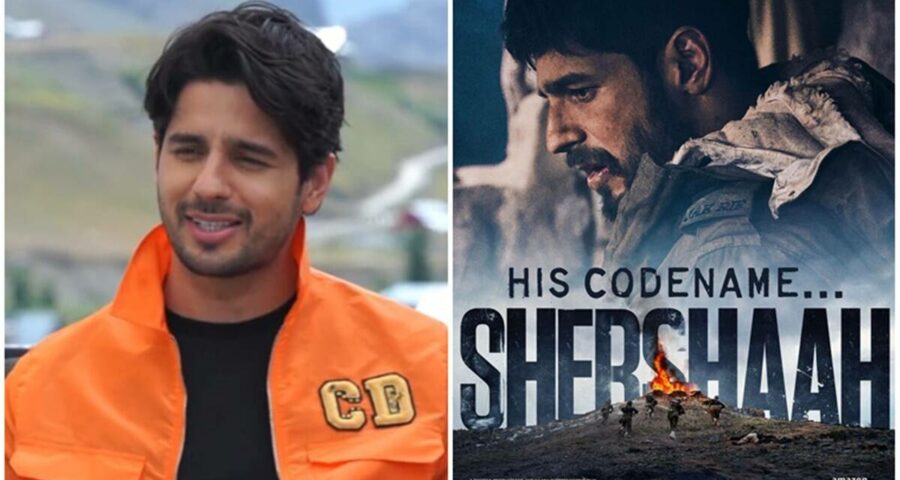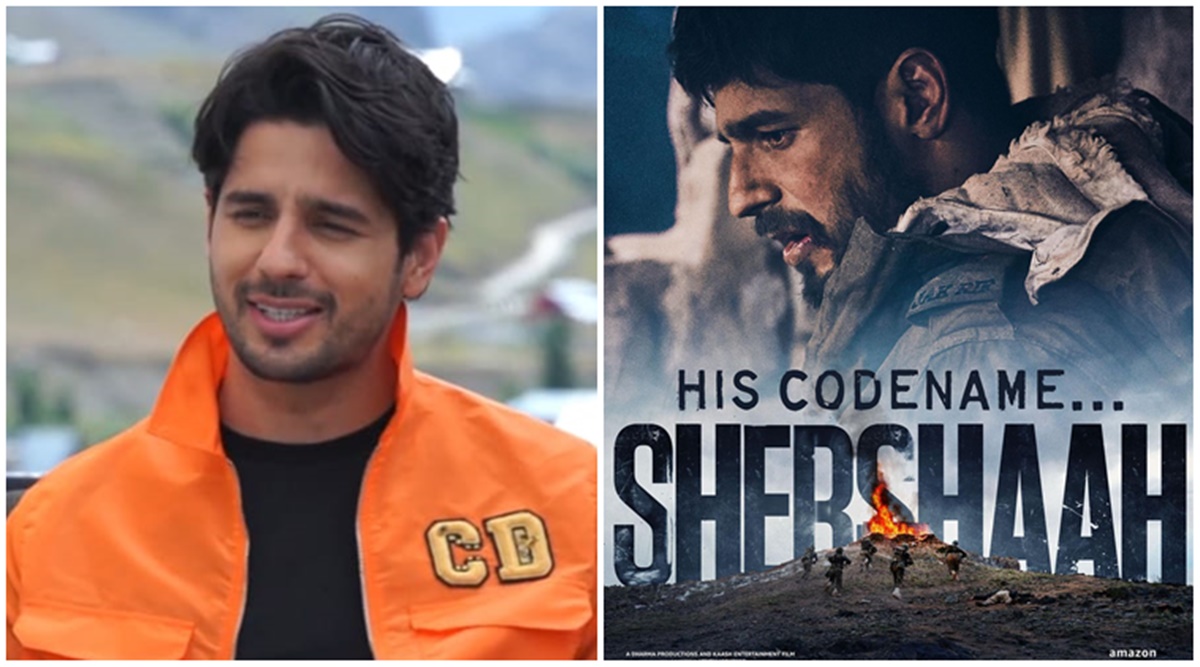Sidharth Malhotra stars as Kargil war hero Captain Vikram Batra in Shershaah, while Kiara Advani plays his fiancee Dimple Cheema. Shershaah will arrive on Amazon Prime Video on August 12.
In 2016, Sidharth Malhotra had no writer, director or a reliable production team behind him. What he had was a hope of bringing to fruition a longtime dream of Captain Vikram Batra’s twin brother Vishal Batra — to have a biopic on the life of the Kargil War hero. Sidharth couldn’t let the story pass, after all he was getting a chance to bring to screen the life of the dynamic soldier, who was known as much for his courage as for his charm.
Through the course of the film’s making, which took close to four years, however, the actor in Sidharth Malhotra found itself in conflict with the sense of responsibility he felt to the memory of Batra and to his family. “I might be doing my job as an actor but for that family, who’s letting us use their story, it’s not just a commercial film,” Sidharth says as he and director Vishnu Vardhan sit down for an interview with indianexpress.com against the backdrop of Tiger Hills in Drass, Kargil where the 1999 war between India and Pakistan was fought.
The actor’s emotional involvement with the film was ascertained even at the Shershaah trailer launch a few days ago when he sounded short of words to describe his experience of playing Vikram Batra. “This location looks very scenic but to think that in 199 this was actually a battlefield… I was quite emotional on the stage and couldn’t put it in words because this is something I am really attached and passionate about, the film and the character.”
Excerpts
Sidharth, is it true that Shershaah was earlier with Junglee Pictures, where it got stuck for long and then you decided to take it to Karan Johar?
Absolutely. When I met Shabbir Boxwala and Vishal Batra first, they gave me an introduction of what they wanted to do. I had surely heard of Vikram Batra but didn’t know so many details of him. We had a massive script at that time. We didn’t have a director, just had some material. It was a very early set up and that’s why we had another production house, who was doing it.
Months and years went on and we could not get a solid script and a correct team for it. I remember having this conversation with Vishal Batra when I was shooting A Gentleman in Bangkok. “If you want to make this film, we will have to take some drastic steps and maybe change teams and producers,” I told Vishal.
A post shared by Sidharth Malhotra (@sidmalhotra)
Hmmm.
And when I knew he was comfortable with it and trusted my decision, I approached Karan saying, “It’s a lovely script and it’s something Dharma has never made.” That time, Gunjan Saxena was not on the horizon as well. So, I said this is something Dharma should do. He read it. Of course, Karan having the foresight saw the merit in it and from thereon we got Sandeep (Shrivastava, writer), then Vishnu, who agreed to make this as his first Hindi film. It took a long time but I am happy with the end result and the team. That’s what matters.
Vishnu, besides it being the story of a war hero, as a director what was so cinematic about Shershaah that you thought it lent itself to the screen?
Whatever you see on screen actually happened. That’s the beauty of it. It’s also documented as such. When you talk to people around him, family, friends and officers that served with him, sometimes you really tend to believe is it really true? But that’s what actually happened. Like the dialogues he has spoken in the film are what he said in his life. Imagine what kind of a man he was. A guy, who’s very daring, flamboyant, a daredevil… These are all the traits of someone becoming a legend.
I remember Lt Gen YK Joshi telling us that after the capture of 5140, there was something in him. Everybody, who speaks about him, says that there was something about him. He was extremely friendly. It’s not about you trying to get connected with him, he will connect with you no matter what. This is what everybody, who knows him, said. When you hear something like this about someone, you get excited. It pushes your adrenaline. So, it’s fun. You don’t want to miss any of those things.
Sidharth, is it difficult to find comfort in a shoot where you are playing someone real and the sense of responsibility that you would feel towards him, his job and his family would never leave you?
It’s nerve-wracking to see that I might be doing my job as an actor, we might be making films but for that family, who’s letting us use their story, it’s not just a commercial film. It’s their family’s story, it’s their son and brother there. I remember when I was shooting in Palampur, I had met the family before, but it was the first time I visited their house. On the first floor they have a lovely museum of all his belongings, his clothes, camera or his diary, medals, it was very overwhelming.
First, I could connect with them because they are such a warm, Punjabi family. I come from that background as well. Maybe that’s why they thought I fit it (the role) because I am a North Indian and they felt I looked like him. I remember coming back from their house and telling Vishnu over dinner, “When you meet the family… It’s more than just a film. It’s such a big responsibility because we are telling their son’s story. So, we can’t be looking at it from a commercial point of view.”
Vishnu was the wiser one. He said we can’t take that stress right now. We have locked on to a lovely script and we are midst shooting and we just have to put our heads down and keep working, which completely made sense because now when you see it… We can’t keep that stress every day. Having said that, I am extremely excited yet nervous to show it to the family and I pray they feel we have done justice to their son’s story.
Vishnu, taking from this, in case of biopics, how does a director decide where his or her loyalties lie: to the source of whom he or she is telling the story– in this case Vikram Batra’s family– or the story that he is telling?
https://www.instagram.com/p/CR8dWnKAaiC/
A post shared by Sidharth Malhotra (@sidmalhotra)
I think you need to be true to the story, to what you are going to say, which is what the family is going to be happy about because there are millions of people who know the story and those who don’t know. It has to reach them. You being true to what you have heard and learnt makes a lot of appeal even to the family.
To both of you, most of the war films tend to glorify battles. But war leads only to loss. How do you approach a story like Shershsaah, which is of course about this man’s courage and valour but is also about him losing his life and leaving behind many to grieve.
Vishnu: It’s purely about what you believe in, what that character believes in and to what extent he would stand by his beliefs. Once you watch the film, you will realise… It’s not the question of sacrificing life. It’s about how much it can inspire people.
Sidharth: Once you show what it is for the family and the loved ones to miss that someone again gives you the same example that it pretty much leads to loss. Though we aren’t taking holistic take on whether the battle was right or wrong, it’s just to show… It’s there in the subtext, in the writing that you will feel a part of us is really saying that…
Source: Read Full Article


